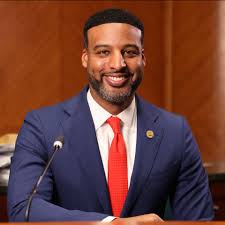10/29/2025

Houston City Council members voted Wednesday to approve the purchase of a $16 million facility in East Downtown designed to serve the city’s unsheltered population. The site at 419 Emancipation Avenue, previously operated as a migrant shelter, will become a “low-barrier” homeless center, or so-called “superhub,” offering between 240 and 320 beds along with mental health support, substance abuse programs, and pathways to permanent housing. The city projects the center could open in early 2026.
The facility is intended to serve as a central triage location for a variety of services, but city documents indicate that annual operating costs are expected to range from $10 million to $14 million, with one-time federal funding covering the first three years. Beyond that period, there is no clear source of long-term funding.
 Council Member
Council Member Edward J. Pollard
Council Member Edward Pollard was the sole dissenting vote, raising concerns about cost, scale, and the facility’s effectiveness in addressing the broader homeless crisis. After touring the site, Pollard questioned the purchase price, which fell between two appraisals ranging from $10 million to $20 million. “We’re purchasing this building for $16 million—$10 million higher than what it’s appraised for on HCAD, and $6 million higher than the independent appraisal—without knowing who’s going to operate it, how programs will run, or what the long-term costs will be,” he said.
Pollard emphasized that the facility will only serve a fraction of Houston’s unhoused population. “We have roughly 4,000 unhoused individuals in Houston,” he said. “This building would have about 200 to 250 beds. If we spend all our homeless dollars on this one project, what are we going to do for the other 3,800 people who remain unhoused?”
He also raised concerns about the low-barrier model. “This is a transient place. People can come and go as they please. Many in this population need more services—medical treatment, hospital care—that go beyond what this facility can provide,” Pollard said. He noted that the center will not require stays, meaning residents may leave before receiving critical support.
Funding was another key concern. The city plans to allocate nearly all federal homeless funding—approximately $40 million from post-Hurricane Beryl federal relief—to this single facility. Pollard questioned whether concentrating resources on one project is the most effective approach. “This is just step one, and we barely have enough for step one. How are we going to have enough money for step two?” he said.
Pollard also raised concerns about the logistical challenges facing Houston’s unhoused residents, noting that many are not located near the proposed site. He questioned how they would be able to access the center, emphasizing that resources are being allocated to about 250 beds while thousands of others remain without housing.
Despite his objections, the council approved the purchase, signaling a major investment in Houston’s homelessness strategy. While city officials project that the facility could serve up to 600 people annually, Pollard warned that most residents will require more than 30 to 60 days of support before moving into permanent housing, underscoring the challenge of addressing homelessness citywide.
At the same time, Pollard expressed support for Larry Satterwhite, the mayor’s Director of Public Safety and Homeland Security for the city of Houston, noting his prominent role in guiding and communicating the development of the “super‑hub.” He acknowledged that the project is an ambitious effort to address homelessness but stressed that significant challenges remain, including questions about funding, accessibility, and the facility’s capacity to serve Houston’s broader unhoused population. While supporting Satterwhite’s leadership, Pollard emphasized that he continues to scrutinize the project’s scale, operational plans, and long-term effectiveness in addressing the city’s complex homelessness crisis.
Pollard’s dissent underscores ongoing debates over the scale, funding, and approach of Houston’s efforts to provide housing and services to its unhoused population. He stated, “I agree that homelessness is an issue that needs to be addressed—just because we need to do something doesn’t mean we need to do anything.”
